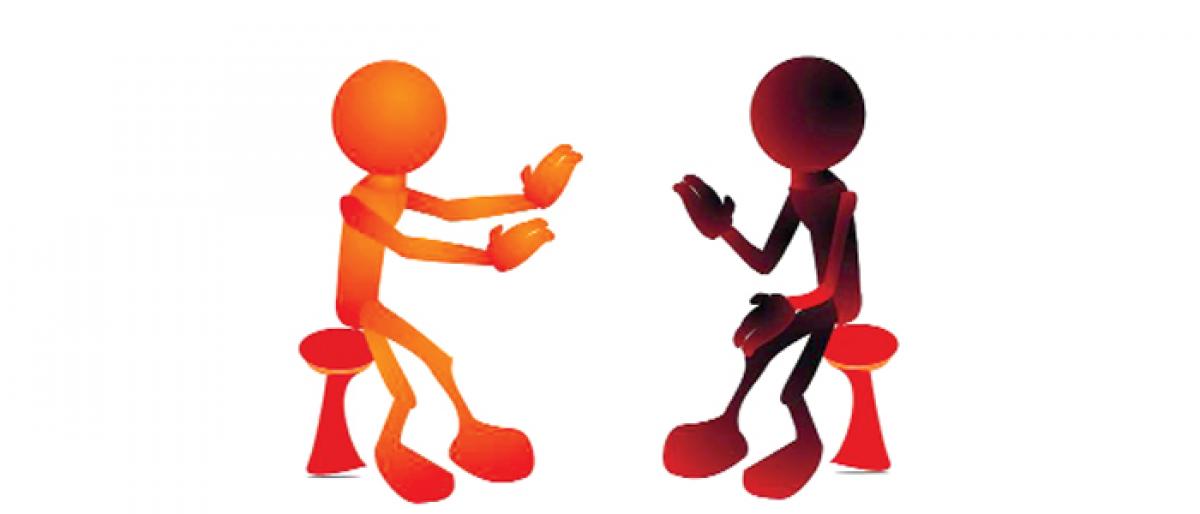Live
- Rising Rajasthan Pre-Summit: MoUs worth Rs 63,463 crore signed in mining, petroleum sector
- Swiggy's IPO subscribed 3.59 times on last day
- Hold gram panchayats in villages to make decision public, Kejriwal tells sarpanches in Punjab
- Calcutta High Court stays suspension of 7 medical students on ragging charges
- Reliance Power’s stock hits 5 pc lower circuit after SECI ban
- Shaina NC slams MVA for caste-based, appeasement politics
- CBI arrests Delhi govt official for taking bribe from shopkeeper
- Unilateral appointment of arbitrators in public-private contract violates Article 14: Supreme Court
- Akhil Sachdeva set to give a fresh twist to the magic of Atif Aslam's Tere Bin
- Vanchana: A Tale of Justice, Secrets, and Betrayal
Just In

I normally cannot stand people who know more than I do. When I say something, the ideal reaction I expect from the audience is to go wide-eyed, say ‘Really? I didn’t know that!’, and hang on to every word I utter thereafter. That kind of a reaction primes me up to wax eloquent about any topic fearlessly. It’s a heady feeling and adds to my sense of well-being. Since I love to disseminate knowledge
I normally cannot stand people who know more than I do. When I say something, the ideal reaction I expect from the audience is to go wide-eyed, say ‘Really? I didn’t know that!’, and hang on to every word I utter thereafter. That kind of a reaction primes me up to wax eloquent about any topic fearlessly. It’s a heady feeling and adds to my sense of well-being. Since I love to disseminate knowledge to anyone who is willing to listen, it adds up nicely.
However, those heady days are now gone. Touch anyone these days and they come back with a curt ‘I know, I know’. I hate these ‘I know’ people because with that one response they end all conversation and go back to their phones and devices, leaving the speaker to face extreme rejection trauma and suffer pangs of low self-esteem. It’s a dangerous and unhealthy trend.
For example, I was invited to speak at a school recently. I was naturally thrilled at the prospect of addressing a captive group of 400 children who were duty-bound to listen to me until the end. ‘Today I will speak about…’ I began and mentioned the topic of the day. Instead of going wide-eyed the crowd started murmuring, ‘I know’, ‘I know’. What more can I say when the audience says it knows what I am going to talk about in the first couple of minutes? If they knew everything beforehand why invite me at all? After recovering a bit I asked the children what they knew. They burst into 20 different versions, each one differing fundamentally with what I knew. I pulled off a decent comeback and managed to complete my lecture. But once they say ‘I know’, it’s curtains. I had lost them at the first ‘I know’ itself.
The ‘I know’ malady is a recent phenomenon. Thanks to the internet and its ubiquitous pal, the smartphone, everyone on the planet has heard all that has to be heard from the past, present and the future. From ‘How to send good morning messages’ to ‘Sharing success secrets’ to ‘10 great disasters’ everyone has seen and heard everything. So the moment you say ‘Quantum physics’ or ‘Ancient religions’ or ‘Wardrobe malfunction’ everyone goes ‘I know’, ‘I know’ and switch off from the subject in the manner of people who have dealt extensively with it. Everyone seems to know everything.
I had my doubts though. Do these ‘I know’ people really know everything? To find out, I tested one ‘I know’ specimen I know. ‘About nuclear medicine…?’ I started. ‘I know, I know,’ he started off. ‘What do you know?’ I persisted. ‘It’s the medicine they use after nuclear attacks,’ he mumbled, checking his phone. ‘Oops, no connectivity,’ he said sheepishly. Aha! ‘Have you heard the latest on Einstein?’ I asked. ‘I know, I know, he’s caught in the Hollywood sex scandal right?’ My suspicions were confirmed. I asked my third and final question.
‘How do you spell your ‘I Know?’ ‘I know, I know,’ he said. ‘I as in I and No as in No.’ Gotcha! ‘So that’s it?’ I asked severely. ‘You don’t even know your nos. You simply ‘no’ everything?’ He looked at me, shook his head and said ‘Dude, don’t you get it? “I No” means I don’t want to listen to you. We don’t need to know everything. All we need to know is to say “I No” to save ourselves from boring lectures about stuff that’s all over the internet.’
I know, I know. They’re just like me. They don’t like listening to people too.
By:Harimohan Paruvu

© 2024 Hyderabad Media House Limited/The Hans India. All rights reserved. Powered by hocalwire.com







